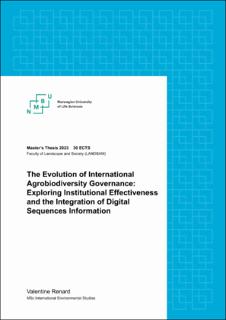| dc.description.abstract | The international biodiversity governance regime is a complex web of policies and regulations that has the potential to address pressing global issues like food security, promoting farmers’ development, or even biodiversity crisis alleviation, but that is also concerned with ethical dilemmas related to the unfair distribution disparities of benefits from genetic resources, the commercialization of nature’s components, and the unrecognized exploitation of indigenous and local communities’ work. This paper explores the historical development and current state of affairs surrounding the governance of agrobiodiversity focusing especially on the fair and equitable achievement of benefit sharing from the utilization of plant genetic resources. The study examines four international agreements related to plant genetic resource, the IUPGR, the CBD and NP, the ITPGRFA, and the KMGBF, as case studies within the biodiversity governance regime. This with the aim to clarify whether the agreement’s status as regulatory or market-based and pertaining a stewardship or ownership approach correlate to its institutional effectiveness degree. The research project also seeks to uncover the challenges and opportunities for the governance of genetic resources that raised from the advance of digital sequences information as a new outstanding kind of data, which undeniably created interconnections between these agreements, in the similar manner that, in my opinion, decades- old sovereign rights and property quarrels have. Additionally, the paper aspires to emphasize the potential of multilateral mechanisms for future development of biodiversity agreements. In the first part, the analyses of the four case studies detail how the agreement’s relationship to the two sets of independent variables influence its output and outcome from an institutional effectiveness point of view, and if relevant what broader international and national impacts it has generated. In the second part, the paper explores the relationship between DSI and the governance of agrobiodiversity as a highly controversial topic in international fora negotiations. | |
